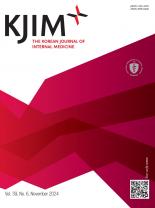|
Infectious diseases
Can reactogenicity predict immunogenicity after COVID-19 vaccination?
Young Hoon Hwang, Kyoung-Ho Song, Yunsang Choi, Suryeong Go, Su-Jin Choi, Jongtak Jung, Chang Kyung Kang, Pyoeng Gyun Choe, Nam-Joong Kim, Wan Beom Park, Myoung-don Oh
Korean J Intern Med. 2021;36(6):1486-1491. Published online May 28, 2021
Background/Aims: This study aimed to assess the association between local and systemic reactogenicity and humoral immunogenicity after severe acute respiratory syndrome coronavirus 2 (SARS-CoV-2) vaccination.
Methods: Adverse events were prospectively evaluated using an electronic diary in 135 heal..
|
|
|
Cardiology
Different therapeutic associations of renin-angiotensin system inhibitors with coronavirus disease 2019 compared with usual pneumonia
Hae-Young Lee, Juhee Ahn, Juhong Park, Chang Kyung Kang, Sung-Ho Won, Dong Wook Kim, Jong-Heon Park, Ki-Hyun Chung, Joon-Sung Joh, JI Hwan Bang, Cheong Hee Kang, Myoung-don Oh, Wook Bum Pyun; The Korean Society of Hypertension; The National Committee for Clinical Management of Emerging Infectious Diseases
Korean J Intern Med. 2021;36(3):617-628. Published online April 16, 2021
Background/Aims: Although it is near concluded that renin-angiotensin system inhibitors do not have a harmful effect on coronavirus disease 2019 (COVID-19), there is no report about whether angiotensin receptor blockers (ARBs) and angiotensin-converting enzyme inhibitors (ACEIs) offer any protective..
|
|
|
Airborne transmission of coronavirus disease 2019: a clinician’s perspective
Myoung-don Oh
Korean J Intern Med. 2021;36(2):467-470. Published online February 5, 2021
|
|
|
Original Article
In vitro activity of lopinavir/ritonavir and hydroxychloroquine against severe acute respiratory syndrome coronavirus 2 at concentrations achievable by usual doses
Chang Kyung Kang, Moon-Woo Seong, Su-Jin Choi, Taek Soo Kim, Pyoeng Gyun Choe, Sang Hoon Song, Nam-Joong Kim, Wan Beom Park, Myoung-don Oh
Korean J Intern Med. 2020;35(4):782-787. Published online May 29, 2020
Background/Aims: As the coronavirus disease-2019 global pandemic progresses, screening of antiviral agents effective against severe acute respiratory syndrome coronavirus 2 (SARS-CoV-2) is urgently needed. In addition, considering the viral load kinetics of SARS-CoV-2, which peaks early in the illne..
|
|
|
Selecting coronavirus disease 2019 patients with negligible risk of progression: early experience from non-hospital isolation facility in Korea
Pyoeng Gyun Choe, Eun Kyo Kang, Sun Young Lee, Boram Oh, Dahae Im, Hyo Yeon Lee, Hyemin Jung, Chang Kyung Kang, Min Sun Kim, Wan Beom Park, Eun Hwa Choi, BeLong Cho, Myoung-don Oh, Nam Joong Kim
Korean J Intern Med. 2020;35(4):765-770. Published online May 29, 2020
Background/Aims: As the novel coronavirus (coronavirus disease 2019 [COVID-19]) outbreak progresses rapidly, staying home is recommended for suspected patients; however, the safety of this recommendation is uncertain. In Korea, non-hospital facilities called “living and treatment centers (LTCs)” ..
|
|
|
A cluster of tertiary transmissions of 2019 novel coronavirus (SARS-CoV-2) in the community from infectors with common cold symptoms
Nam Joong Kim, Pyoeng Gyun Choe, Sang-Joon Park, Jaegyun Lim, Wang Jun Lee, Chang Kyung Kang, Wan Beom Park, Moon-Woo Seong, Myoung-don Oh
Korean J Intern Med. 2020;35(4):758-764. Published online June 11, 2020
Background/Aims: As the global impact of the novel coronavirus disease 2019 (COVID-19) has been severe, many countries have intensified containment activities to eliminate virus transmission, through early detection and isolation strategies. To establish a proper quarantine strategy, it is essential..
|
|
|
Infectious diseases
Middle East respiratory syndrome: what we learned from the 2015 outbreak in the Republic of Korea
Myoung-don Oh, Wan Beom Park, Sang-Won Park, Pyoeng Gyun Choe, Ji Hwan Bang, Kyoung-Ho Song, Eu Suk Kim, Hong Bin Kim, Nam Joong Kim
Korean J Intern Med. 2018;33(2):233-246. Published online February 27, 2018
Middle East Respiratory Syndrome coronavirus (MERS-CoV) was first isolated from a patient with severe pneumonia in 2012. The 2015 Korea outbreak of MERSCoV involved 186 cases, including 38 fatalities. A total of 83% of transmission events were due to five superspreaders, and 44% of the 186 MERS case..
|
|
|
In vitro antiviral activity of ribavirin against severe fever with thrombocytopenia syndrome virus
Myung Jin Lee, Kye-Hyung Kim, Jongyoun Yi, Su Jin Choi, Pyoeng Gyun Choe, Wan Beom Park, Nam Joong Kim, Myoung-don Oh
Korean J Intern Med. 2017;32(4):731-737. Published online November 30, 2016
Background/Aims: Severe fever with thrombocytopenia syndrome (SFTS) is an emerging infectious disease caused by severe fever with thrombocytopenia syndrome virus (SFTSV), a novel bunyavirus. As yet, there is no effective antiviral therapy for SFTS. Ribavirin is a broad-spectrum antiviral agent, whic..
|
|
|
Pneumatosis Intestinalis with Pneumoperitoneum Mimicking Intestinal Perforation in a Patient with Myelodysplastic Syndrome after Hematopoietic Stem Cell Transplantation
Bhumsuk Keam, Jeong-Hoon Lee, Myoung-Don Oh, Inho Kim, Sung-Soo Yoon, Byoung Kook Kim, Seonyang Park
Korean J Intern Med. 2007;22(1):40-44. Published online March 31, 2007
Pneumatosis intestinalis (PI) is an uncommon disorder characterized by an accumulation of gas in the bowel wall, and has been associated with a variety of disorders and procedures. We describe a 35-year-old man who undertook hematopoietic stem cell transplantation due to myelodysplastic syndrome...
|
|
|
















